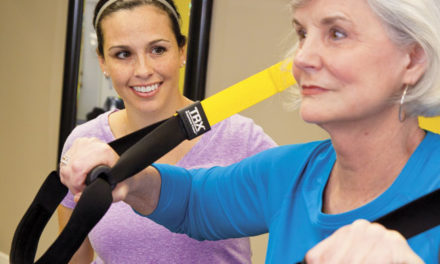BY JANET MANDELSTAM
If your blood sugar level is higher than 100 but lower than 126, you are pre-diabetic. If your blood sugar level rises above 126, the diagnosis is full-blown diabetes with all of its accompanying complications. To help you keep your blood sugar level from reaching that tipping point, the nurses and dieticians at the IU Health Diabetes Center offer diabetes prevention classes that emphasize lifestyle changes, notably exercise and a low-fat diet.
“Diabetes is an epidemic that affects about 25 million people in the U.S.,” says Kenda Jochim, a registered nurse, certified diabetes educator, and manager of the center. Diabetes leads to an elevated risk of heart disease and is the leading cause of amputations, kidney disease, and blindness. “One out of three children born in 2000 will have the disease,” says Jochim. “Prevention is where we should be focusing our efforts.”
The three-hour class is offered twice a month in Bloomington. Those who come, says Tammy Morrison, a registered nurse who teaches the class, include people with elevated blood sugar levels, those who are obese and/or have a family history of diabetes, and people over 40.
For the first half of the class, Morrison says, “a nurse teaches about diabetes—what it is, what’s going on physiologically, what lifestyle changes need to be made, and what are the barriers to making changes.” The second half focuses on nutrition and is taught by a dietician who emphasizes a low-fat diet (“no more than 25 percent of calories from fat,” says Morrison) and how to control carbs.
There is a follow-up meeting one month later. “We review blood sugar readings and weight and try to spend a little time on each person’s progress,” says Morrison.
Both Jochim and Morrison cite a 2002 study published in the New England Journal of Medicine showing that lifestyle changes can reduce the risk of diabetes by 58 percent. Pre-diabetic subjects in the study reduced the fat in their diet and exercised for at least 30 minutes for 5 days a week.
The two RNs are ardent proselytizers for prevention. “We can make an impact,” says Jochim. “If we get a mother to change, she may change the diet of her kids.” And anyone over 40, she says, “should be screened for diabetes every three years.”
The cost of the class, including a glucose meter to test blood sugar levels at home, is $45. Classes are limited to 15 and are usually booked a month in advance. A doctor’s prescription is no longer required. For more information, contact the center at 353-9258.











